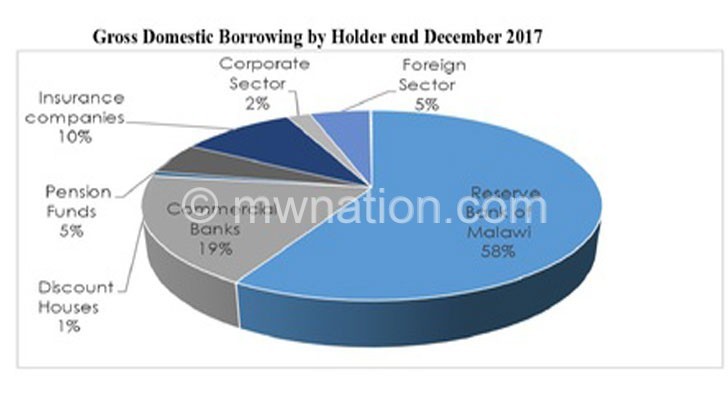Debt, deficits pile pressure on economy
Rising debt and fiscal deficits continue to put pressure on economic gains the country has attained recently putting prospects of a 2019 positive macroeconomic outlook under strain.
While economicthink-tanks project a rebound in growth and single-digit inflation rate tocontinue, government’s appetite for borrowing and fiscal deficits speakotherwise with recent figures from the Reserve Bank of Malawi (RBM) showing arise in public debt by K78 billion at the end of the previous quarter toK3098.8 billion in the third quarter of 2018 (July to September).

RBM third quarter Financial and Economic Review report shows increased external debt stock at $2 088.8 million (about K1.5 trillion) an increase of $19.3 million, from $2 069.5 million (K1.5 trillion) recorded in the preceding quarter while stock of domestic debt stood at K1 561.0 billion, representing an increase of 4.1 percent from K1 499.5 billion recorded in the previous quarter.
On the other hand, Treasury has in the first quarter of the 2018/19 Financial Year (July-September) recorded a deficit of K86.1 billion, from a deficit of K27.7 billion recorded in the preceding quarter, and K128.5 billion recorded in a similar period in 2017.
This follows an over-expenditure of K372.0 billion against K285.9 billion revenues with total government expenditure in review period rising by K75.5 billion (25.5 percent) to K375.0 billion.
In the 2018/19 Financial Year, Treasury expects to close the year with a fiscal deficit of K242.9 billion which is to be financed by net external borrowing of K66.8 billion and domestic borrowing of K176.1 billion, according to the 2018/19 financial statement.
In its Malawi Economic Monitor (MEM), while World Bank strongly recommends government to improve its fiscal discipline, it emphasises the need to reduce pressure on domestic borrowing.
The report observes that in 2018, there has been a dramatic shift in the composition of government domestic borrowing from RBM to the private sector, with government borrowing from the banking‑sector increasing by 145 percent and by 75 percent from the non-banking sector.
Secretary to the Treasury Ben Botolo said recently when he appeared before the Budget and Finance Committee of Parliament that government was facing tough time to balance the budget after the World Bank withheld its K60 billion budget commitment.
Economics Association of Malawi (Ecama) executive director Maleka Thula said cumulative budget deficits the country has experienced over the years have potential of crowding out private sector borrowing and investment, especially when government borrows domestically to finance the budget gap.
Last week, World Bank warned government to avoid expenditures that are not budgeted for in the re-run to the May 21 2019 Tripartite Election.
In his statement, the bank’s country manager Greg Toulmin identified mantaining fiscal prudence as one way coping with shocks associated with weather challenges and external factors beyond Malawi’s control like fuel.
Treasury revised downwards the 2018/19 fiscal overall deficit including grants, from 4.5 percent of the gross domestic product (GDP) to 3.8 percent of GDP.
In the 2017/18 financial year, there was a seven percent increase.





